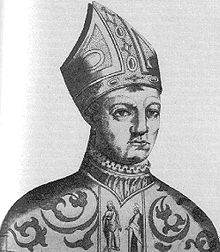Antipope John XXIII
|
Antipope John XXIII |
|
|---|---|
 |
|
| Papacy began | 1410 |
| Papacy ended | 1415 |
| Predecessor | Alexander V |
| Opposed to |
Gregory XII (Roman claimant) Benedict XIII (Avignon claimant) |
| Personal details | |
| Born | c. 1365 Procida, Kingdom of Naples |
| Died | 22 December 1419 (aged 48–49) Florence, Republic of Florence |
| Coat of arms | |
Baldassarre Cossa (c. 1370 – 22 December 1419) was Pisan antipope John XXIII (1410–1415) during the Western Schism. The Catholic Church regards him as an antipope, as he opposed the Pope whom the Catholic Church now recognizes as the rightful successor of Saint Peter for various crimes, though later accounts question the veracity of those accusations.
Baldassarre Cossa was born on the island of Procida or in the Kingdom of Naples to the family of Giovanni Cossa, lord of Procida. Initially he followed a military career, taking part in the Angevin-Neapolitan war. His two brothers were sentenced to death for piracy by Ladislaus of Naples.
He studied law at the University of Bologna and obtained doctorates in both civil and canon law. Probably at the prompting of his family, in 1392 he entered the service of Pope Boniface IX, first working in Bologna and then in Rome. (The Western Schism had begun in 1378, and there were two competing popes at the time, one in Avignon supported by France and Spain, and one in Rome, supported by most of Italy, Germany and England.) In 1386 he is listed as canon of the cathedral of Bologna. In 1396, he became archdeacon in Bologna. He became Cardinal deacon of Saint Eustachius in 1402 and Papal legate in Romagna in 1403. Johann Peter Kirsch describes Cossa as "utterly worldly-minded, ambitious, crafty, unscrupulous, and immoral, a good soldier but no churchman". At this time Cossa also had some links with local robber bands, which were often used to intimidate his rivals and attack carriages. These connections added to his influence and power in the region.
Cardinal Cossa was one of the seven cardinals who, in May 1408, withdrew their allegiance from Pope Gregory XII, stating that he had broken his solemn oath not to create new cardinals without consulting them in advance. In company with those cardinals who had been following Antipope Benedict XIII of Avignon, they convened the Council of Pisa, of which Cossa became a leading figure. The aim of the council was to end the schism; to this end they deposed both Gregory XII and Benedict XIII and elected a new pope Alexander V in 1409. Gregory and Benedict ignored this decision, however, so that there were now three simultaneous claimants to the papacy.
...
Wikipedia
